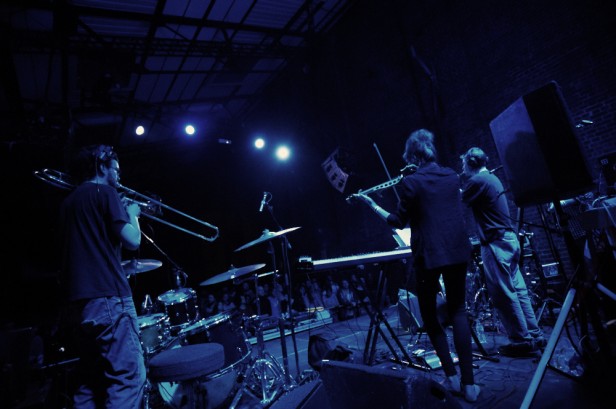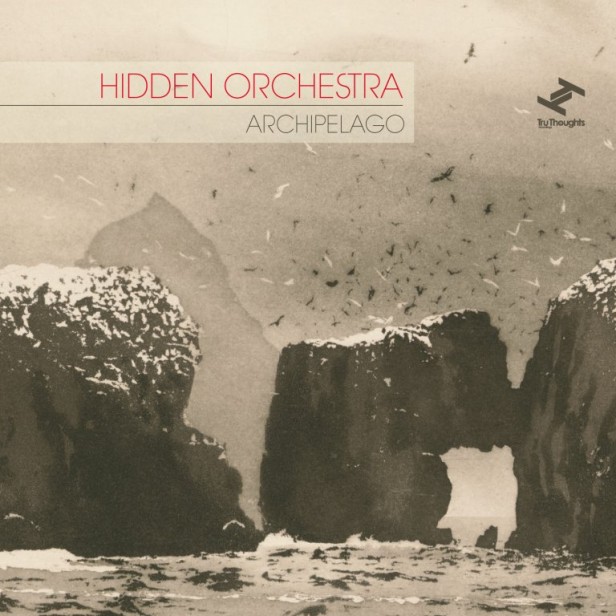Interview: HIDDEN ORCHESTRA
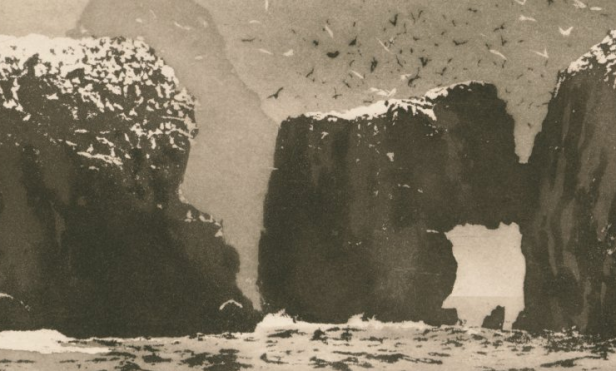
Last time I caught up with Hidden Orchestra it was November 2010 and they were playing at Matt & Phred’s Jazz Club in Manchester. Their debut LP Night Walks had recently been released on Tru Thoughts, and around a fortnight ago the follow up, Archipelago, hit the physical and virtual shelves. We sent over a few questions to find out a little more about how things are going.
Big shout to Soundcrash who had Hidden Orchestra play recently (check a couple of snaps below) and have all manner of top shows coming up here.
Hidden Orchestra have a fair few European tour dates left too, check them here.
hiddenorchestra.com / fb / twitter / www.tru-thoughts.co.uk
Hi Joe! Jamie here from Groovement, we caught up last at Matt & Phreds, hope all is well!
Hello – I remember it well – my pleasure…
Tell us about the new album…
It’s called ‘Archipelago’, and is out on 1st October (yesterday as I write this) on Tru Thoughts Records.
Night Walks seems to have gone down as a bit of a classic, do you feel the Hidden Orchestra name carries more weight since its release, or is it more about the live sets?
The studio stuff and the live show are almost two separate entities – I write the music in a studio for the CD albums, and the band then perform it live – and the two can be quite different experiences. But at the same time they are very much complementary, and both seem to be generating some nice word-of-mouth response.
What did you want to achieve with the release of the follow up? Are there vast differences between this and the debut as so much blood, sweat and tears went into Night Walks? Was this one easier or the traditionally ‘difficult second album’?
The writing of this album overlapped with Night Walks by about 4 years, even though it was finished two years later – so inevitably there are many similarities in style, texture and form… To me, it feels like a development of many of the themes and ideas of Night Walks, and I’m happy that I’ve given it my best shot… But still, now that it has been finished for months, I can hear it more objectively, and there may well be occasional self-conscious moments..
You’re quite a unique act in terms of how you make and perform music. Does that leave you feeling isolated or special?
Never really thought about it to be honest, certainly not in a negative way anyway. I think maybe you’ve summed it up in the question by suggesting that we are only ‘quite unique’… It’s nice that people seem to enjoy that we try to offer something different.
Are you friendly with others on the Tru Thoughts roster? Any plans for working with anyone?
Everyone we’ve met on the roster are nice friendly people – we’ve enjoyed doing various live shows with the likes of Anchorsong, Nostalgia77, Belleruche, Hint, and Alice Russell.. Also loved Maddslinky’s remix of ‘The Windfall’ last year… But no immediate plans for collaborations – I’m keen to get on with taking Hidden Orchestra in new directions, touring, and collating some of the other music projects I do into a kind of remixes album – as well as trying to keep a hand in the radio world, making mixtapes, and juggling various other interests…
You’ve got a special edition LP, limited to 800 copies – was something like this important to you? Is anyone in the band a vinyl head? Is this the best way to listen to the music?
Having that nice LP is a really special thing – to me it feels like the ultimate ideal presentation or manifestation of the album in physical form – I mostly buy and listen to mp3s, but even though I’ve paid good money I often don’t feel like I actually own those ‘records’…
People really seem to appreciate having something physical to represent/objectify/substantiate their ownership of or relationship with music that they care about – and so it’s nice to try and make this object as beautiful as you can, particularly as we frequently sell it to people who don’t even own a turntable – and all our vinyl sales come with a free 320kbps mp3 download version of the full release…
Tim and I both occasionally buy vinyl – and there are many great things about the act of listening to music on vinyl. In purely audiophile terms, CDs are always better quality sound, most faithful to the original sound that the artist/producer heard while creating it – as making vinyl involves all kinds of tweaks such as chopping off the high frequencies and shaping the bass frequencies into mono, and playing it back has many more inherent mechanical complications – but vinyl does also give you a more constant smooth waveform, and that frequency-chopping can give it a really nice characteristic warm sound that much music benefits from…
The best way of listening to the music depends most on nice well-placed speakers, with good bass – or a high-quality pair of headphones. Things like the difference between CD and vinyl are never going to have as much effect as people having one speaker at a wonky angle propping up a bookshelf, or listening to music straight off a laptop or phone…
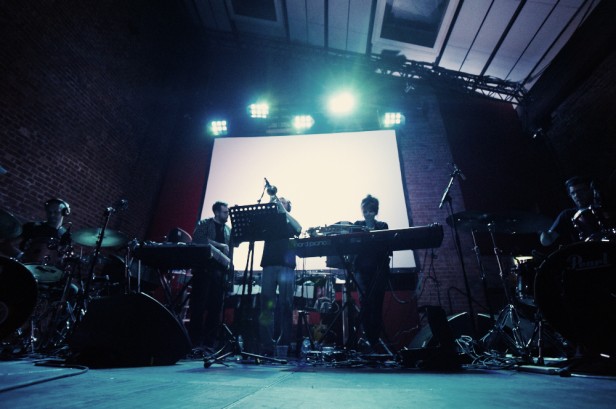
You have lots of European dates coming up – what’s the reception been like out there?
Nearly all our experiences in Europe have been fantastic – and it feels like a real privilege to be getting to travel and work out there.
Broadly the audiences seem really well-informed, discerning, open-minded and responsive, and the treatment you receive as ‘artists’ can be overwhelming – we are always well looked after.
Do you attract particular crowds depending on where you are or would you say it’s a cross section of jazz, hip hop and/or classical audiences? Do you get pigeon holed in any way?
Yeah, there’s a huge variation – and whilst we often encounter really mixed crowds containing people enjoying a new kind of environment (sharply-dressed clubbers itching to dance in a seated jazz cafe, or bearded old boys itching to sit down and smoke a pipe in a loud sweaty club), the audiences are generally dictated to a large degree by the programming style of the venue or promoter.
So if we are going to play at jazz festival, a rock festival, a late-night club with DJs, or a high-brow contemporary arts centre, we usually have a pretty good idea of what the majority of the crowd are likely to be like, and we try to tailor the sets to focus on a particular aspect of the music, as seems suitable to the occasion and place.
We aim to be inclusive, and welcome anyone. In the same spirit we don’t mind being pigeon-holed – though perhaps at times it has been frustrating that people have perceived us to be primarily a jazz band, as I have no background, training, or improvisatory skills in jazz… I’m just a listener who has incorporated some of the ideas into an aesthetic that shares greater influences from many kinds of classical, dance and folk musics…
But at the same time, it’s an honour to be bracketed with musicians that are considered serious and technically proficient, and sometimes granted attentive thoughtful crowds.
What can you tell us about Norman Ackroyd’s work?
Norman would genuinely be my favourite artist even without the extraordinary coincidence that I discovered his work through his daughter, my better half for the last ten years… Most of his work consists of vivid monochrome etchings of landscapes, and he is particularly interested in shorelines – the coast and islands of the British Isles.
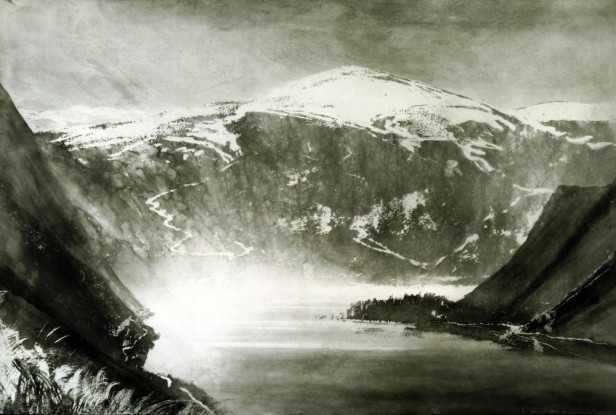
His work chimes in somehow with what I aim to do musically, though in a different and greatly more refined way. I think it’s something to with the way that his etchings are incredibly vibrant and realistic, and yet at the same time somehow abstract. He’s able to create distinctive and recognisable features with broad brushtrokes, that leap off the page and yet still appear shrouded in mist…
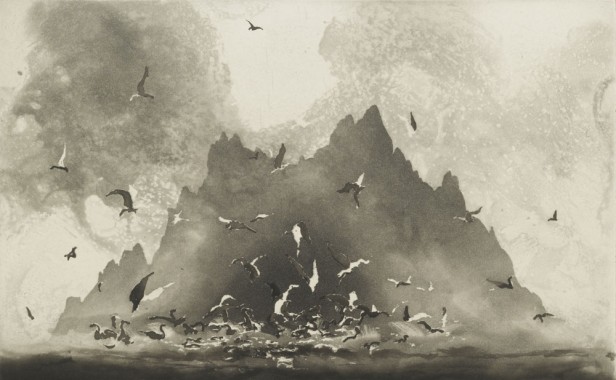
What do you look/listen for in found sounds and do you have any particular inspirations in this field?
All kinds of things – I like characterful soundscapes (such as the call-to-prayer echoing round Istanbul from dozens of rooftop speakers, or the traffic in Cairo at 3am, or the dawn chorus next to the stream outside the cottage in the Highlands where I spent a week working on the album) – repetitive rhythmic sounds which I can edit and program into loops (like the mechanical clacking of machinery, cross-country skiing, the song or call of an individual bird, an oven-timer or even a faulty thermostat) – and individual percussive or atmospheric noises (such as using an axe-chop for a snare, making beats from stomping and shuffling footsteps, or a synth-style filter-sweep out of a waterfall).
Inspirations include all my time working on location recordings and sound design for radio dramas and documentaries with BBC producer Matt Thompson, nature sound recordists like Chris Watson and Bernie Krause, and producers who made use of soundscapes in their work (DJ Cam’s night-time crickets and owls were a big influence for me). Also I found a session working with with Norwegian producer Jan Bang very inspiring, and his approach of treating all sound as sample-able audio, for making music…
Releasing music… You made Footsteps a free download pre-Night Walks plus had a pre-album mixtape and warmed up the new one with the release of an EP and video… What have you found works best in terms of getting people to hear your music, and are there any particular media appearances that stand out as bringing in a slew of new listeners?
The releasing strategy is essentially planned and managed by Tru Thoughts, who carefully think through what they think will work best with each release from every artist, based on both previous experience and new ideas.. Everything is run past us, but we trust in and approve of what they do.
The mixtapes are more something I’ve done off my own back – since the label first encouraged me to make a mix, since I’m not really a DJ I thought I would make a mixtape in the studio… And since I was doing it that way, I decided I should make it fairly elaborate and take advantage of various possibilities for long overlaps, mashups, remixes, re-edits, extra layers of beats and basslines, and adding lots of original material, sound design, and many forms of spoken word, from rapping and poetry through to interviews and audio books…
Each one takes me months to create, working on them mostly for sheer enjoyment in between other work, and they end up being almost like proper albums for me.
The response to them has been fantastic, across various sites such as Mixcloud, ParisDJs, and Soundcloud – I am working on the one to follow Archipelago at the moment…
